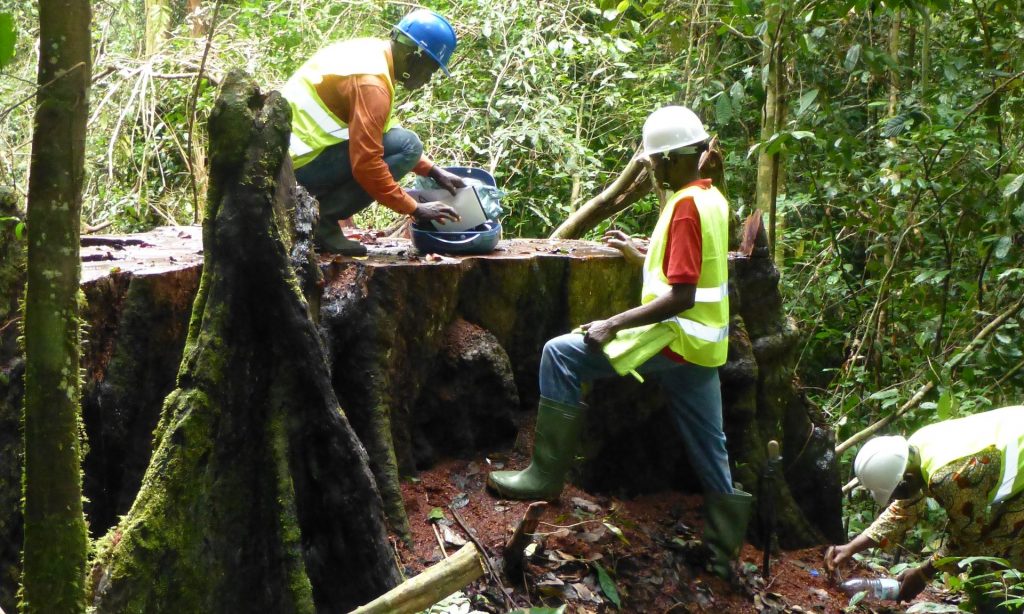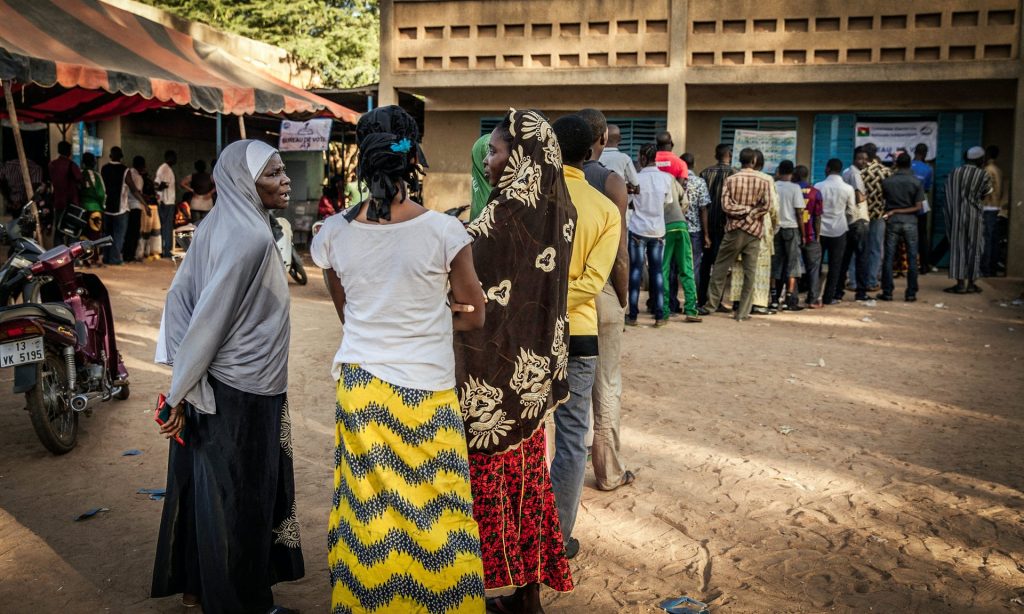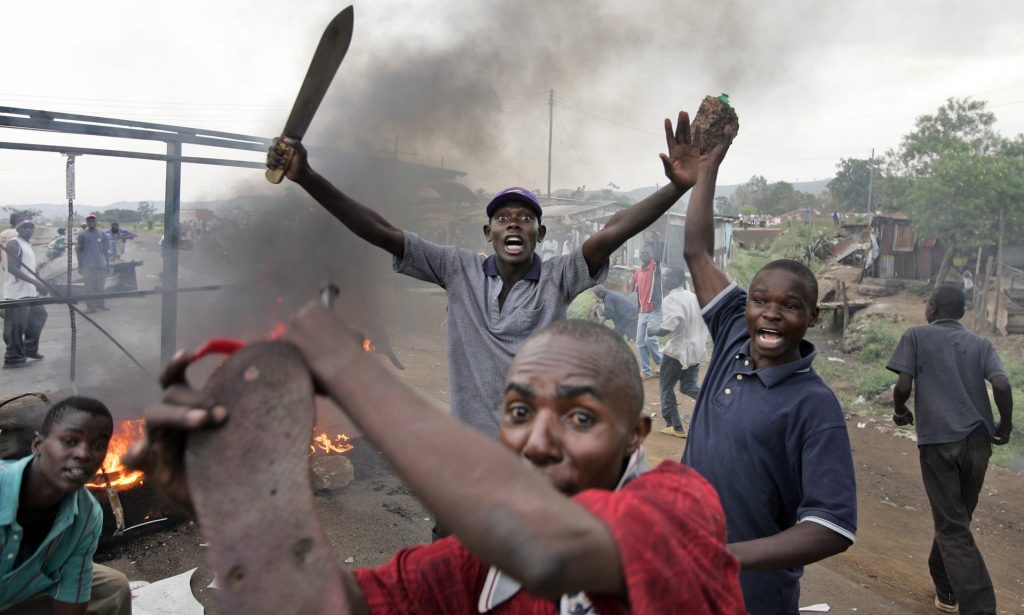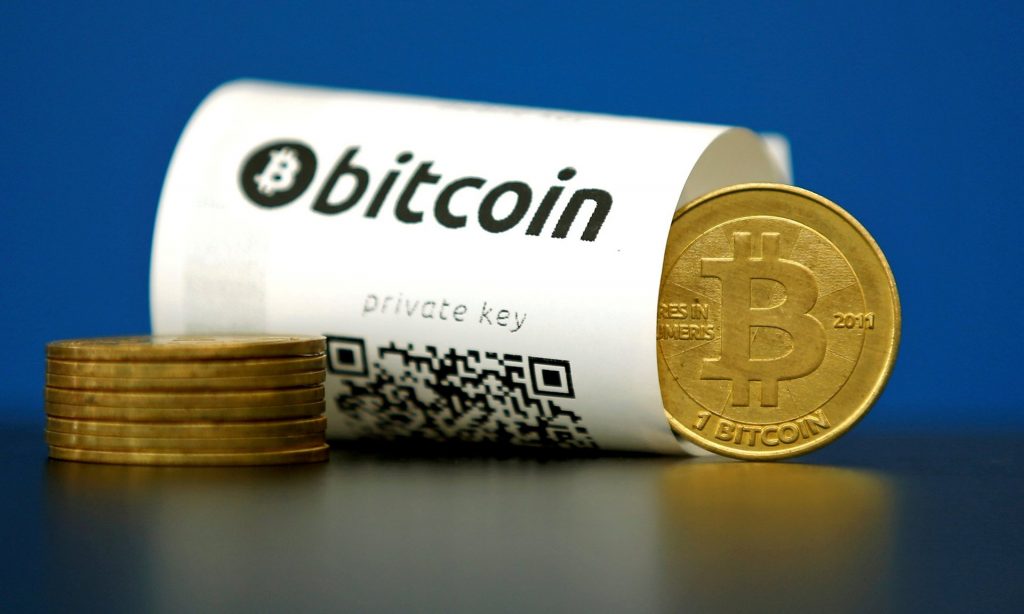
Photograph: FODER
Protecting the environment
In the village of Mapubi, in the forests of south-west Cameroon, locals have watched as large swaths of their land have been destroyed.
Mapubi’s proximity to coastal ports and the increased demand for timber due to population growth in the cities mean the pressure on forests in the area is believed to be at its highest since the colonial period.
A similar plight affects many who live in the forests of the Congo basin, whose lands have been depleted by illegal logging, mining, industrial plantations and even by strict conservation activities, which often resulted in large-scale evictions of people from the environments they had populated for generations.
In many cases, the problem lies in the fact that these forest lands are largely unmapped, so loggers and farmers can claim they were unoccupied. But another problem lies with reporting – people who witness illegal activities in the forests might live hundreds of miles from the nearest police station, or even telephone.
To address this, the Rainforest Foundation UK is trialling an initiative that equips local communities to report illegal activities in their own forests in real time, using satellite phones and specially designed mapping software.
ForestLink, which has funding from the Department for International Development, allows local people who witness illegal behaviour in the forest to report it in a few clicks of a button. The reports, which are geo-tagged, are sent to a centralised database and local partner organisations can then go out and confirm the incident.
The speed of reporting is key, says Rodrigue Ngonzo, from Forêts et Développement Rural (Foder) in Cameroon. An oft-cited reason for inaction by authorities is “the very long time between the observation of illegal activities, verification and receipt of an external independent observation report”, he says.
Simon Counsell, the executive director of Rainforest Foundation UK, says the technology could revolutionise forest protection strategies.
“In the past, it’s been a very top-down approach. With this new model it’s very much about empowering people from the grassroots upwards, to allow local people to play a much more active role in protecting their forests.”
So far the programme has been trialled in Cameroon, Ghana, the Democratic Republic of Congo and Peru.

Photograph: Wouter Elsen/EPA
Spreading democracy
Less than a year after a military coup, a mobile app helped Burkina Faso hold free and fair elections.
The initiative, championed by the Burkina Open Data Initiative (Bodi), was the stabilising force that helped the country restore peace and democracy after a major political upheaval.
In October 2014, President Blaise Campaoré, who had ruled for 27 years, was overthrown by a popular uprising. Less than a year later, the interim government that replaced him, led by Michel Kafando, was unseated in a military coup three weeks before scheduled elections.
The coup sparked fresh turmoil but the power of the protest movement that had initially kicked out Campaoré coupled with diplomatic pressure led to swift restoration of the interim government.
That December, Roch Marc Christian Kaboré was voted in as the new president in a poll Kafando hailed as a “triumph of orderly transition, democracy and freedom”.
In the volatile transition, ensuring citizen trust in the electoral process was vital, and Bodi was at the centre of these efforts. Before the revolution no one was interested in open data, explains Bodi’s deputy manager, Malick Tapsoba, but suddenly “so many people were demanding change and transparency which meant we had the political will to do what we couldn’t before”.
His team started work on a mobile app, called Open Election, to help voters follow the the results in real time. Previously it could take two weeks for some people to find out the results, but now it was a matter of hours.
Sure enough just hours after the poll closed on 29 November, results for the first 21 districts were published on the app. By the next afternoonthe full result was becoming clear.
The results were uploaded to an open web portal, allowing a broad network of civil society groups to access and verify them. The media also had access, ensuring that people without smartphones could also keep informed.
According to Liz Carolan from the Open Data Institute, which was also involved in the project, “one of the most sensitive time periods, especially in transition states, is between the time of polls closing and the time the final results are announced”. The app helped people maintain their faith in the election process, she adds
Encouraged by the impact of the initiative on the election, Bodi is now trying to push the government to release data on health, education and infrastructure projects so they can make it centrally available on one website.

Reporting violence
From recording post-election violence in Kenya, to supporting news organisations covering the war in Gaza, to helping the residents of Port-au-Prince rebuild their city after the devastating Haiti earthquake, Ushahidi has become one of Africa’s biggest tech exports.
The crowdsourcing app, the name of which means “testimony” in Swahili, launched in January 2008 as violence spread through Kenya after contested general elections.
Amid a state ban on live broadcasting, Kenyans used text and email to record what they were seeing on a centralised map, building the most comprehensive picture of the violence that was taking place.
Ushahidi’s founders said it took them two sleep-deprived days of coding to come up with the project, driven by the belief that “the number of deaths being reported by the government, police, and media [were being] grossly under-reported”.
With its headquarters in Nairobi, Ushahidi has since been used to launch crowdsourcing projects by more than 90,000 people in more than 190 countries, ranging from the Russia to Australia.
“The good thing about technology is that if you build it correctly, it can be deployed and used anywhere there is a need,” says Daudi Were, its executive director.
People can use crisis mapping tools like they use anti-virus software: with no need to dwell on the country of origin, he adds.
It can be tough for African startups to propel their solutions to global success. There is limited investment in the sector and developers may struggle to get the visibility for their products.
But with a team of tech pioneers behind it Ushahidi has become a success story. Today the company has a network of developers scattered across the globe helping users develop open source maps to do everything from ranking the best Christmas lights display in Houston, to reporting sexual and racial discrimination in Sweden.

Advocates of bitcoin believe it could help many Africans move into the formal economy.
Photograph: Benoit Tessier/Reuters
Financial access
In the wildest of claims, bitcoin – the virtual paperless and stateless currency transacted on the borderless internet – was going to tear apart traditional money transfer companies and help alleviate poverty.
Accessing the multibillion-dollar remittance flows to Africa certainly has substantial appeal, perhaps helping to attract some large seed investments in African bitcoin startups.
Firms have also sought to draw users to bitcoin by undercutting the high costs of international money transfers. Some of its backers even claim it could leapfrog traditional financial infrastructure on a continent where two-thirds of people are “unbanked”.
Parts of Africa have already come a long way in developing mobile money payment systems that give the unbanked millions a chance to move into the formal economy. Advocates of bitcoin on the continent say it would take this a step further, though it requires an internet connection which more than three-quarters of Africans still do not have.
A small group of users – mainly in South Africa, Kenya and Nigeria – trade speculatively in bitcoin via online forex sites, as they would any other currency.
Africa hosts several established bitcoin exchange services, such as ICE3X and BitX in South Africa and BitPesa in several countries in east and west Africa, where users can trade between bitcoin and traditional currencies. Peer-to-peer trading sites such as LocalBitcoins.com are also popular – in early June, nearly 10m Kenyan shillings (£75,000) was traded via the site in Kenya in one week.
“You don’t really need a third party – in Kenya you can send money via M-Pesa direct to my phone in exchange for the bitcoins you buy. There has been an amazing increase in volumes traded,” says Michael Kimani, head of the African Digital Currency Association.
“One of the biggest opportunities for bitcoin could be online payments, but I’ve also seen people funding online wallets, using it for online sports betting.”
Spending bitcoin in the region is more difficult. South Africa’s largest online marketplace, Bidorbuy, recently introduced bitcoin payments on its site; a handful of other online retailers, mostly in South Africa, already accept the digital currency. In most cases, a bitcoin exchange company handles the back end of the transaction, while merchants quote prices in local currency.
Despite slow progress so far, Nii Quaynor, often described as the “father of the internet in Africa”, tells the Guardian that “digital currency and transaction frameworks for the internet are the next step” for the continent. In March, the company he chairs, Ghana Dot Com (GDC), launched what it claims is Africa’s first bitcoin mining facility.
Quaynor is hopeful too about the potential for blockchain technology – the distributed transaction ledger seen as the cornerstone of bitcoin innovation – and says nonfinancial applications around land registries and voting could be transformative. Banks in Africa are also looking into potential uses of blockchain.

